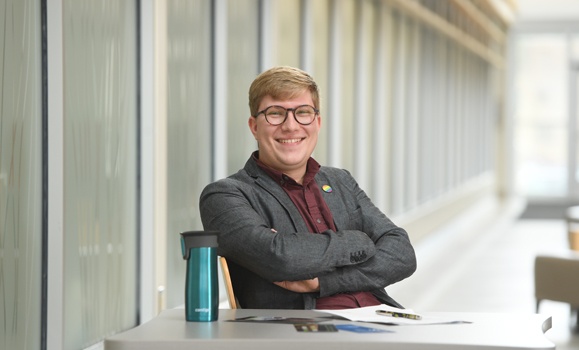HÂţ» PhD student Landon Getz has made impressive strides in his academic career in just a few short years, publishing papers in world-leading journals and earning prestigious awards for his work in microbiology.
And while the Vanier Scholar and Killam Laureate has felt supported professionally in his field, he hasn’t always seen himself reflected personally.
“I don’t have a lot of LGBT role models within science,” says Landon, who first arrived at Dal as an undergrad in 2013 from his home in Medicine Hat, Alberta.
Determined to change that for himself and for others, Landon started thinking about what he could do to boost visibility for 2SLGBTQ+ individuals in science, tech, engineering and math (STEM) fields the across Atlantic Canada. The result: Queer Atlantic Canadian STEM (QAtCanSTEM).
Science for everybody
Launched earlier this month, QAtCanSTEM provides an inclusive and welcoming space for other 2SLGBTQ+ researchers across the region to find resources, role models and community.
“My goal is focused on making the whole STEM space more inclusive for everybody,” says Landon.
The group’s initial push will centre around a series of online profiles asking people how they identify and then questions about their research, their day-to-day life in STEM and some of the changes they’d like to see.
Although community spaces such as DalOUT and South House provide support for 2SLGBTQ+ individuals more generally on and off campus, Landon saw the need for a group geared specifically toward STEM.
He says studies have shown that queer faculty in STEM often hide their identities at work, likely the result of a broader, largely heterosexual community culture within those disciplines.
“There haven’t been a lot of these groups because I think a lot of people are still a bit afraid to be open about their identities within STEM,” he says. “I guess we have to start somewhere.”
Bringing community together
Longer term, the group has plans to launch an event called the QAtCanSTEM Colloquium. The one-day conference will feature keynote talks, oral presentations, poster presentations, and panels, all centred around 2SLGBTQ+ people doing science in Atlantic Canada.
“What is going to be really nice about this conference is that it’s not just focused on the issues, so for people coming in it will be a freeing environment. You can just be yourself and know that you are comfortable and safe there,” says Landon.
The conference and the group more generally are modelled on an organization called LGBTSTEM, which is doing similar work in the UK. Landon counts that group’s co-founder, Alex Bond, senior curator in charge of birds at the Natural History Museum in London, as a mentor and inspiration.
“We’re not Boston or San Francisco or anything like that. We have smaller communities and because of that fewer role models” says Landon. “A lot of Alex’s work has motivated me to do what I’m doing here.”

